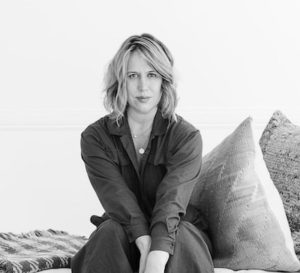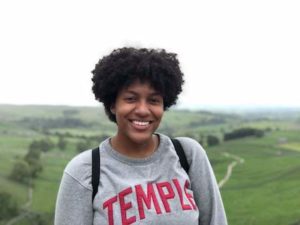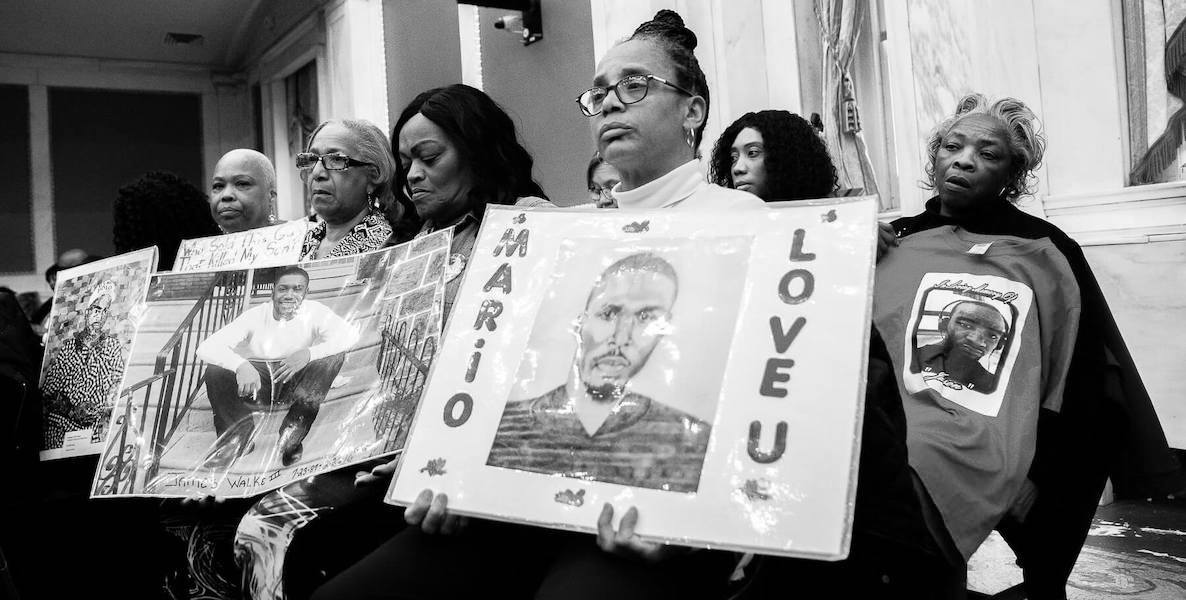“If you look up almost any night of the week, in Philadelphia, if you live in one of these neighborhoods that’s affected by gun violence—and it’s almost every neighborhood in Philadelphia—and you know to look up at sunset, you will see these balloons.”
That’s Colwin Williams, one of the city’s violence interrupters, talking to award-winning journalist, podcaster, and author Jo Piazza about the nightly vigils in Philadelphia for victims of gun violence, which typically end with the release of balloons into the dusk sky. It’s a haunting image, and one all too familiar to Philadelphians in the last year.
Listen to Episode 1 of Philly Under Fire here:
The numbers don’t lie: As of April 11, 2021, there have been 139 homicides in Philadelphia—a 36 percent increase over 2020—and 440 nonfatal shootings. That’s on top of a year when shootings skyrocketed: By the end of 2020, 499 of our neighbors had been murdered, and another 2,200 shot.
But numbers don’t tell the whole story. That’s why, at the start of 2020, The Philadelphia Citizen tapped Piazza to spend a year reporting for a podcast on Philadelphia’s gun violence epidemic—its roots, its victims, its toll on our communities—and the solutions that could be effective in curbing it.
When she began the project, Piazza had no way of knowing that 2020 would see a global pandemic, as well as the highest rate of gun violence in Philadelphia in years. But even as Covid-19 ravaged communities, Piazza and her associate producer, Nadira Goffe, continued to dig into their reporting: talking to victims, mothers, healthcare providers, city officials, journalists who have covered the violence, and dedicated grassroots leaders here and around the country who are devoting their lives to stopping the spread of this violent epidemic.
Listen to Episode 2 of Philly Under Fire here:
The result: Philly Under Fire, a heart wrenching seven-part series that will alternately devastate, move, and shock listeners—and, hopefully, fuel action. You can stay on top of all new episodes as they drop by checking our Philly Under Fire episode guide.
Here, Piazza talks about the experience of working on Philly Under Fire in an unexpectedly traumatic year—and the lessons we can take away from what she’s learned.
Jessica Blatt Press: You spent the last 14 months reporting on gun violence in Philadelphia, and looking at how people here and around the country are attempting to curb it. It’s a powerful, heartbreaking series, and a real call to action. What are your biggest takeaways?

Jo Piazza: There are a lot of stories that stuck with me throughout this reporting, but there are two in particular that have stayed with me. I did several interviews with Colwin Williams, who works on the team with Cure Violence. They’re a grassroots organization that goes out in the streets after a shooting, talks to the people in the neighborhood, talks to potential shooters, talks to the victims. They try to make sure there’s not going to be a retaliation.
But Colwin also runs these vigils for victims of gun violence. And at the vigils, a bunch of balloons are released into the air, usually at sunset. And Colwin said to me, If you look up almost any night of the week, in Philadelphia, if you live in one of these neighborhoods that’s affected by gun violence—and it’s almost every neighborhood in Philadelphia—and you know to look up at sunset you will see these balloons.
And I didn’t know that these balloons existed, that I should look up, because I think there’s just not the awareness that this is happening right under our noses. And so I don’t want to tell Philadelphians to wake up, but I want them to think we can’t have a vibrant city unless all of us have a vibrant city. I want Philadelphians to recognize that gun violence is happening all over our city, and even if it is not next door to you, it affects this city that we love and that we live in.
There were times when we were reporting this podcast when we said we don’t know if we can do it. We don’t know if we can pull this off. Because of the pandemic, but also because of all of the issues surrounding gun violence.
While I was reporting the podcast there was actually a shooting at the playground where I take my kids. About three blocks away from our house, at 8 at night. And there were two murder victims; there were 21 shots fired, during a time when I could’ve been walking across that playground with my two children. And I was reporting the podcast so I knew how often this happens. But a lot of the mothers in our neighborhood were shocked. And I don’t think we can be shocked. I think we have to recognize that this happens every single day and that it’s a problem and it’s a problem that our government can and should be fixing.
I think another very important part of this podcast is that you can’t fix a problem that you can’t see and that you don’t care about. And I don’t know if enough people care about this right now. Which is why we wanted this to be a podcast of stories. We don’t want to preach at anyone in this podcast. We want you to hear the stories in people’s own voices. Because no one —including our government officials— will work on the problem if you can’t see it, you can’t hear it, you can’t understand it, you can’t care about it.
JBP: Part of what’s so powerful about the series is that you really do give a platform to the people in Philly who are on the ground doing this work every day. You step back, and center them. Talk about the range of people you met in your reporting, and how important it was to you to make sure you were lifting up their voices.
JP: This podcast has nothing to do with me. I just happen to be a human who reports and knows how to create audio content. The goal is for it to be a podcast of voices.

One of the things we learned early on was that the people who are really doing the work on gun violence in our city are small grassroots community organizations that have no funding. They are the ones doing all of the heavy lifting—it is not our city government. It is not our D.A.’s office. And it is not our police department. It’s not. Helen Ubiñas from The Inquirer said that to me right off the bat—she said those are the people that are really doing this work and those are the people you have to talk to. And a lot of people didn’t want to talk to us. To be honest, people have fatigue. People who have been fighting this war for so long have a lot of exhaustion from there not being more government- and city-enacted solutions to work on this in a very meaningful way.
People now ask me how do you solve gun violence? And I say solve poverty. Solve poverty and solve our broken education system, get people meaningful jobs that bring dignity to their lives, so that kids who may fall into the trap of violence and move into the illegal economy have something else to do. Have bigger dreams and have role models that are showing them those lives are possible. So there’s no easy solution for gun violence, which made this very difficult.
JBP: Among the many other people you introduce to listeners is Jennifer Lawson, of The Philly Obituary project—explain what she does, and why her work is so important.
JP: I don’t want to present this podcast as if we at The Philadelphia Citizen are just discovering the issue of gun violence. There have been incredible people reporting on this issue way before me, and I want to recognize that we stood very much on their shoulders. And I want to elevate their work in this series and say they did this before we did, they laid all of this groundwork.
The original goal was to try to elevate these stories about people affected by gun violence, so that we could examine the issue in a very nuanced and human-centric way, which is often not done. I think it’s done at places like The Inquirer—[journalist] Helen Ubiñas is wonderful at it. It’s definitely not done enough on television news—all we hear is “there was a shooting in so-and-so neighborhood,” and that’s it. It goes away. It immediately disappears from our consciousness. And we wanted to dig deeper than that.
Then of course, the pandemic happened.
I don’t want to tell Philadelphians to wake up, but I want them to think we can’t have a vibrant city unless all of us have a vibrant city. I want Philadelphians to recognize that gun violence is happening all over our city, and even if it is not next door to you, it affects this city that we love and that we live in.
Jennifer Lawson has been running The Philadelphia Obituary Project, which writes obituaries for victims of gun violence—people who typically would not have their life celebrated in an obituary in a newspaper or on a website because they are a part of a marginalized community or they did die at the hand of gun violence, and perhaps they were involved in the illegal economy. And for so long our media has just missed these people, and said their lives don’t deserve to be chronicled. And Jennifer takes the time to give them not just an obituary, but a damn good obituary. She takes the time to research and talk to victims’ friends and family and paint the landscape of their beautiful lives to show that there are real human beings behind these murders in our city.
JBP: What did you learn about who’s affected by gun violence?
JP: One of the things that we were very interested in going into this is that gun violence acts like a communicable disease. It acts like a virus. And we all know very well how a virus works after this year. It’s transmitted from person to person and the trauma that it causes is transmitted from person to person. So we spoke to emergency room trauma nurses and doctors who treat victims of gun violence, and what that is like to have to do that day in and day out, and how that trauma is transferred to them and how they think that this should be solved.
We talked to victims’ mothers, many of whom are trying to solve their child’s murder on their own because the homicide clearance rate in our city is so abysmal that these women have become private detectives and are literally tracking down their child’s killer on their own.
We talked to teachers who work in schools where kids are affected every day by gun violence, and they have to figure out how to alleviate some of this trauma so that kids can just learn and feel safe. And then we also talked to these young people who, frankly, this year got fed up and said this is enough. And they organized their own protests and wrote their own articles and op-eds and created their own grassroots organizations to try to solve this problem. So all of these voices came together to try to give us a picture of what gun violence looked like in 2020.
And it’s not complete. It will never be complete. But I think it does shine a light on what happened in our city in the past year.
JBP: You also talked to leaders in other cities who are moving the needle on gun violence more than people are in Philly—what rose to the surface as things those cities have in place that Philly lacks?
JP: The cities that are the most successful are the cities where there’s good cooperation between different bureaucratic agencies. And this seems so simple, right, where everyone is talking to each other? Where there are very regular meetings between the police, between the District Attorney’s office, between emergency room physicians and between the people who are out on the streets trying to combat gun violence. The people who are trying to get the shooters to actually lay down their guns. And we do not see any of that cooperation in Philadelphia.
The cities that are the most successful are the cities where there’s good cooperation between different bureaucratic agencies. And this seems so simple, right, where everyone is talking to each other? We do not see any of that cooperation in Philadelphia.
Instead, we see a lot of agencies working on their own. And this is not a problem that’s going to be solved by any lone wolf. This is a huge problem that needs massive coordination between all of the city’s agencies and many many more social services. There are ways to get shooters to put down guns. Those ways have to do with asking them what they need so they don’t pick up the guns in the first place. And that means good social services throughout a city to meet people where they’re at.
JBP: After so many months enmeshed in this issue, how are you feeling, coming out of this process?
JP: When The Philadelphia Citizen first proposed this project, we had no idea that 2020 was going to be the worst year for gun violence in a very long time. We had no idea the pandemic was going to start.
And it was hard. There were times when we were reporting this podcast—and I have to give so much credit to our associate producer, Nadira Goffe, who just worked her ass off on this podcast—but there were times when we said we don’t know if we can do it. We don’t know if we can pull this off. Because of the pandemic, but also because of all of the issues surrounding gun violence. After the George Floyd reckoning a few months into it, I even thought I shouldn’t be the person reporting this podcast. So, so many issues arose. But I think it ended up being a really beautiful seven episodes. It was a hard year for everyone, and I think that that comes across in all of these episodes.
JBP: So, how do you feel now that the series is about to be shared with the world today?
JP: I do love it. I think it turned out great. I hope we do the things we’re meant to do.
Philly Under Fire was made possible through the 2020 Jeremy Nowak Fellowship, funded by Spring Point Partners. This interview has been edited and condensed.
Mothers of gun violence victims at a City Council hearing demanding change.



